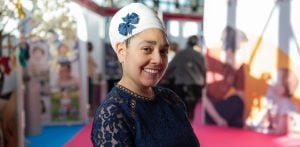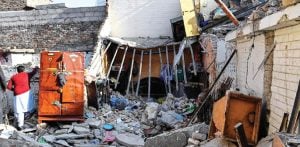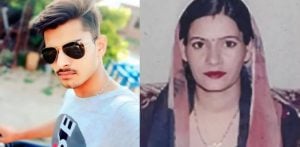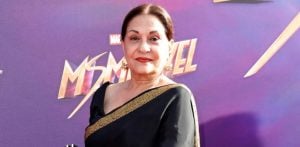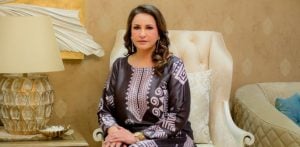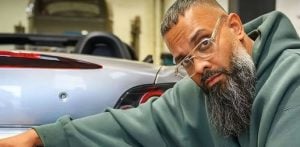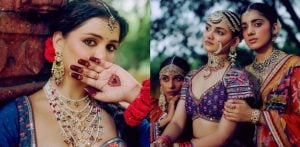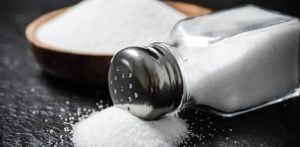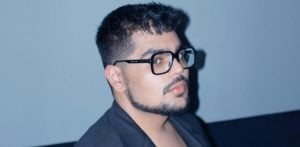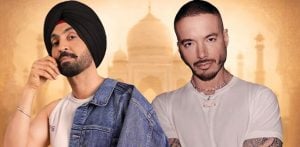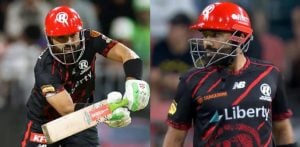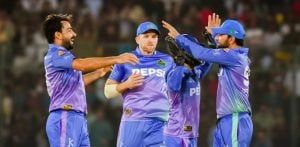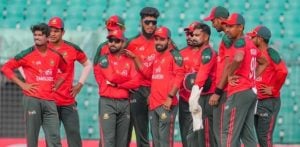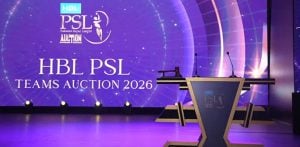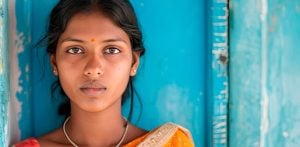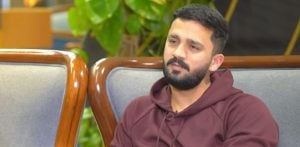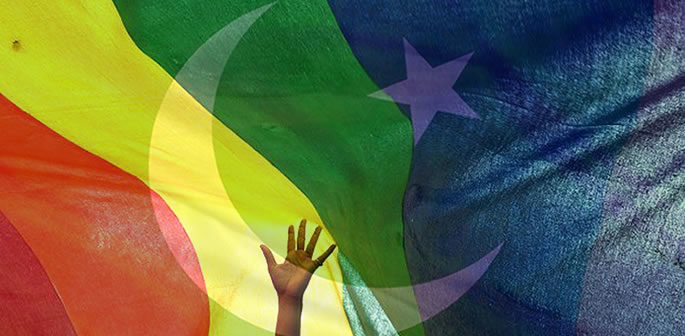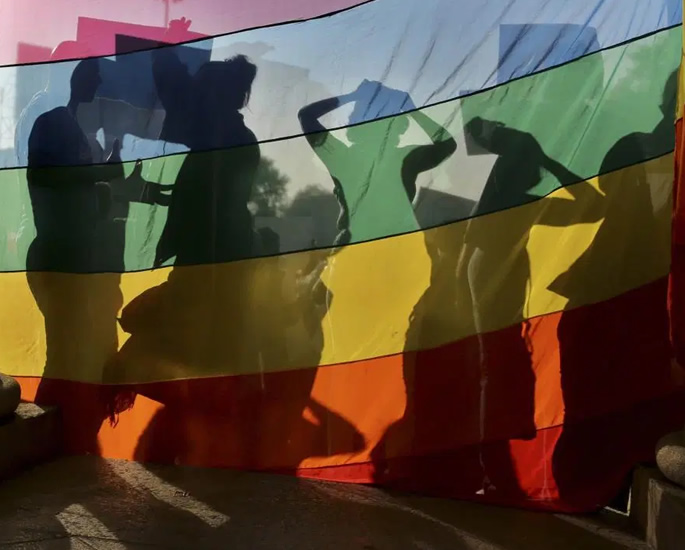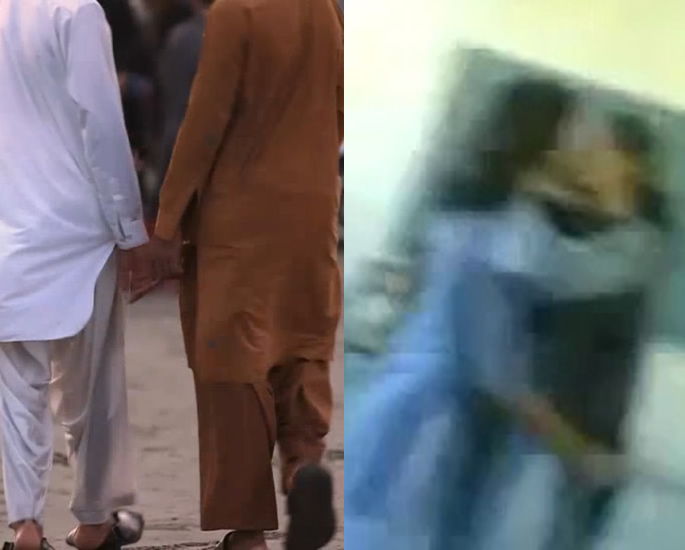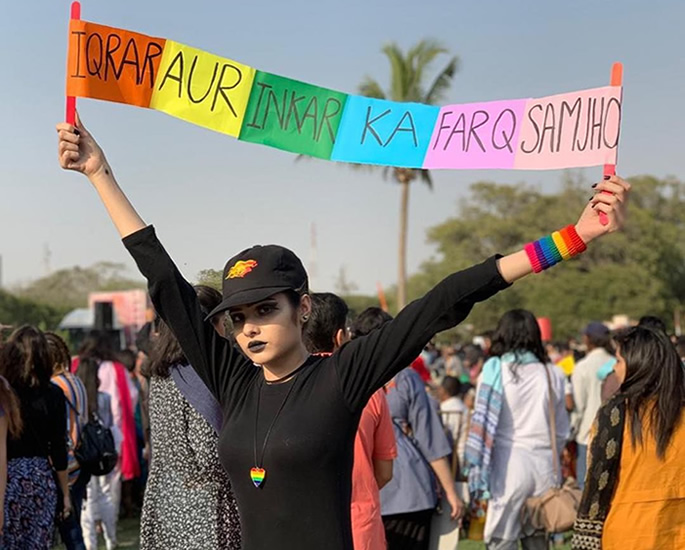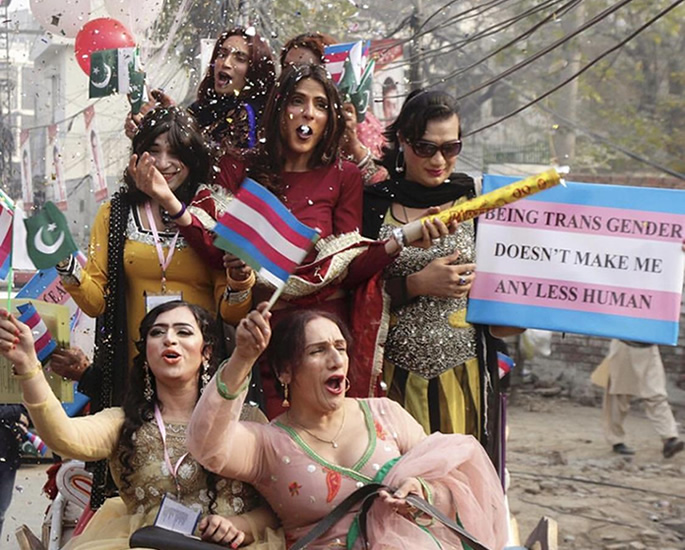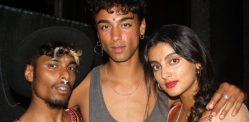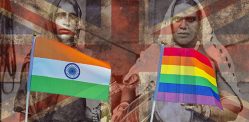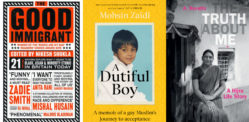"My message is all about love, equality, and tolerance."
Living as a part of the LGBTQ community is not easy in most parts of the world. This is especially true for those who live in Pakistan.
It is, perhaps, a failure of society to not be flexible enough to understand differences in orientation or a complete rejection of it.
Transgenders, for example, in Pakistan have been mistreated for centuries because of their different gender identity.
Humans have commonly been categorised as man and woman on a gender basis. In South Asian countries like Pakistan, this the form, if not the only form of gender, deemed acceptable.
This leads to struggles for those who are different. Especially, those from LGTBQ communities in Pakistan.
However, voices from the LGBTQ community in Pakistan are emerging, growing and awareness are increasing.
Their presence matters and existence in any society cannot be easily ignored now. Both on social media platforms and in real life.
In order to develop a better understanding of such communities, it is important stories and opinions are heard.
DESIblitz interviewed several members of the LGBTQ community in Pakistan. We take a look at five different aspects of their struggles.
Sexual Identity Impact on Family
Home means everything. No matter where one is in the world, they will always find solace and comfort in their homes. This is no different in Pakistan.
It always starts with family and is never easy for siblings, parents, and other relatives to understand the concept of LGBTQ in Pakistan.
It is rather rare that members of the family come to agree with the identity of LGBTQ.
Older generations vs new generations in families result in discomfort and disagreements.
Farah*, a transgender activist from Hyderabad explains:
“Wearing different apparel that didn’t conform to my gender shook my father. He knows about my identity…. To be different in this society is not an easy task.”
She further explains: “I know deep down inside they won’t understand me. Being conformed to an identity that is considered a taboo is only exhausting.”
Tania*, a young woman from Quetta, who identifies herself as a lesbian/sapphic says:
“My mother is in denial and she knows about me.”
“I would say my brothers don’t really care. Although my youngest brother is deeply supportive and so are my friends.”
Daniyal*, a gay activist from Peshawar, tells a quite different story:
“It took me some time but I managed to open up about myself after some tragic events. I think it is rare to be born in a family where you can be accepted as a part of the LGBTQ community.”
Living as an LGBTQ Member in Pakistani Society
In Pakistan, where culture and religion are the overall fabric of the nation, acceptance of anything not seen as ‘normal’ presents major challenges.
Can the Pakistani society understand you as a member of the LGBTQ community?
Of course, it’s not a phase or some identification on a temporary basis. Sexuality is, in fact, a spectrum and a lot of people don’t want to accept that, as Tania explains:
“People are illiterate when it comes to LGBTQ.
“It’s not easy due to the presence of fundamentalists and their apologists.
“We have circles but it doesn’t allow society to accept us.”
Farah holds a more diverse and different opinion as she illustrates:
“I think we’re being tolerated instead of being accepted and that is quite a change.
“It is legally impossible being a part of LGBTQ.”
“Right now, we have a process going on where sensitization and awareness are being made.”
Daniyal is parallel to the statement presented by Farah:
“Homophobia is ingrained in our society, and chances are we cannot change that but things are changing.
“Of course, it is not going to be abrupt.
“Activism is playing a significant role in helping people realise the idea of LGBTQ on a social and scientific basis.”
Influence of Social Media and Literature
How does social media treat the people of the LGBTQ community? That is an important question for today’s global age.
Social media has also allowed the public narrative to be displayed both on a compact and wider scale. Whether it’s public support or shame it can be easily done through social media.
LGBTQ community of Pakistan are a very much part of social media, which does give them a public channel to express their views and opinions.
Most circles of Pakistani society have often condemned, shamed, and disapproved LGBTQ on the internet. The reasons can be attributed to various taboos and social stigmas.
Even the regular Pakistani digital and print media does not endorse the LGBTQ struggle.
In fact, if there is any representation of Pakistani LGBTQ it is either on social media, English literature or NGOs.
Apart from the official languages of Pakistan i.e. Urdu and English, many languages are spoken.
But whether it is Punjabi, Pashto, Balochi, Hindko, Siraiki, Sindhi, Balti, etc. There are very little traces of LGBTQ.
Tania says:
“I think it’s filled with extremists.
“Try expressing your opinion and you’re very likely to be bashed into some incestual or homophobic comments.”
She further adds: “It’s not as safe as it seems but it is much better than being expressive in public.”
Farah shares the same opinion.
Daniyal also shares the same opinion adding:
“It won’t change overnight, the homophobic attitudes. But we’re brave and expressive enough to state our opinions.”
When it comes to Pakistani literature there is practically little or no significance of LGBTQ in traditional texts.
Daniyal tells:
“As far as literature goes, only English literature seems to be progressive despite so many languages spoken in Pakistan.”
“On a historical scale, transgenders, homosexuality, and anything that was against the heterosexual perspective has been disregarded.
“You name it. Any kind of literature from any language did not encourage the ideas that we place under LGBTQ.”
Farah says:
“Even today in media, at least since the ’90s there is a vague depiction of LGBTQ.
“We’re humans too and it is unfair to treat people of LGBTQ with a different perspective.”
“It is deeply offensive to see cis/hetero people playing roles that which can be played by LGBTQ people.”
LGBTQ issues are global and Pakistan cannot afford to leave these issues unaddressed.
LGBTQ Activism and Legislation
Through years of activism, it was in 2015 when the USA approved of Gay marriages. Ironically, it was in 1917 after the Bolshevik revolution when Russia approved of gay rights.
What about Pakistan and its role of activism and legislation regarding the LGBTQ?
Pakistan cannot afford to be left behind where the world is pursuing more and more LGBTQ rights. Pakistan has yet to create a safe environment for women of all circles.
Activism plays a huge role in addressing the rights and demands of the LGBTQ community.
The demands for the right of expression and decriminalization of LGBTQ were made in the Aurat March 2019 in Pakistan.
The foci of activism are public awareness and legislation.
As far as legislation goes, it does not quite support the decriminalization of LGBTQ due to the country’s socio-political environment.
“Activism leads to legislation. We live in a 72-year-old country where the Transgender Bill was approved a few years ago. It needs time to be implemented and accepted in society.” tells Farah
Salman thinks activism regarding LGBTQ rights strongly relies on feminist movements. He is of the opinion that activism needs to develop its roots in society on a broader scale.
“Activism is helping develop create safe spaces for every person in LGBTQ community but it is not enough. The idea of acceptance is different from that of tolerance.”
Tania believes that legislation needs to take steps against hatred and prejudice against LBGTQ:
“Homophobia should be penalized. There is just no point of criminalizing LGBTQ. It’s not harming anybody and has never intended such a thing.”
A Message from Pakistan’s LGBTQ Community
Whether it is placards or social media there’s always a message. Whether that message is literature or figurative, it counts as a message and helps open one’s eyes towards a social issue.
It is easy to express an opinion regarding sexuality in Pakistan only if one is heterosexual. While it is considered a taboo, nonetheless it will not be harshly judged.
On the other hand, anything outside the domain of heterosexuality will be thoroughly questioned and criticised. Because (and this is true) Pakistani society believes in binary values in terms of sexuality.
Sexuality, strictly speaking, is a spectrum and majority of Pakistanis don’t want to accept that. But what about those who share that idea? What do they have to say to the Pakistani society?
“Love has never killed anyone. We aren’t hurting anybody and we never would. I would like them to question from where they are getting their homophobic attitude.” answers Tania
Farah was asked the same question and replied:
“I believe in equality and diversity. It’s not a matter of gender or sexuality but that of being other than cis/hetero. We need to understand sexual and gender-based identities on a spectrum instead of discrete binary issue.”
Daniyal answers the question:
“My message is all about love, equality, and tolerance. Societies that have emancipated LGBTQ+ rights are indeed progressive. We’re only going to form an unjust and unequal society should LGBTQ rights are denied.”
LGBTQ Acceptance and the Future
In this global age, the presence of social media matters a lot. For LGBTQ supporters and activists the importance of social media cannot be emphasised enough.
On one hand, it would appear that the majority of the Pakistani population doesn’t seem to accept LGBTQ.
On the other hand, there is a small circle that is trying its best to promote tolerance and acceptance.
It will take time for both circles to form a mutual synthesis regarding LGBTQ rights. It will take years of arguments and activism. Both sides will not rest but there will certainly be an agreement.
What one cannot say for certain is in what direction the argument will go. From the looks of it, it will depend on economic and socio-political factors.
Quantitatively speaking, the rights of LGBTQ may very well be opposed and, therefore, denied. LGBTQ critics will definitely uphold democracy and its social beliefs for its victory.
But democratic societies also welcome changes and deeply respect the rights of minorities. They are flexible enough to look beyond their quantitative context.
Fairly speaking, it is not up to society to impose its gender-based ideologies and perception. If a society does that, it only implies is inflexibility and resistance towards changes.
The state of LGBTQ in Pakistan cannot be ignored. Pakistan happens to be the 6th most populous country in the world. The rights of LGBTQ count as global issues that should not be undermined.
Pakistani society needs to believe in diversity and social values. They are not just for the western or non-muslim societies but apply for everyone in the world.
Being a lesbian, bisexual, gay, queer, transgender, or asexual doesn’t make anyone less human. It’s just personal preference after all.
It is never too late to reach out to those who have been deprived of basic civility. Social change takes time and requires small but consistent steps.
With the revelations and discussions around gender and orientation growing, there is hope that better understanding will gradually address the struggles of LGBTQ communities, especially, in Pakistan.






